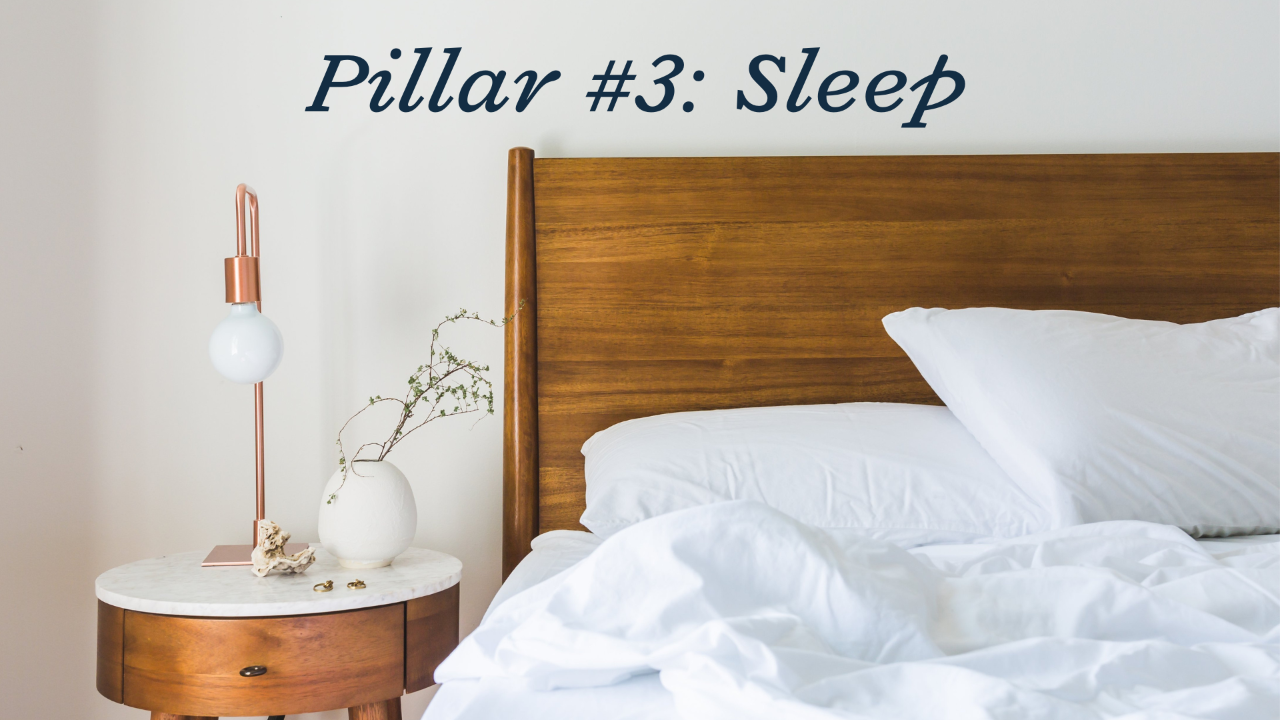The Pillar of Sleep: Recovery and Repair
Feb 28, 2025
Our next pillar for our foundations for health is one that is so important and that so many women struggle with, especially in midlife: sleep. Sleep is a time for rest, but also time for repair, and cellular rebuilding.
Unfortunately, our sleep can be disrupted for a multitude of reasons, whether it’s night sweats, kids or animals waking us up, or difficulty winding down at night. At Uplift For Her, we prioritize sleep and strive for our patients to experience quality, uninterrupted, restorative sleep. We know that without deep restorative sleep, the body cannot properly heal and repair itself.
Building a Sleep Routine
We always like to ensure our patients have a good sleep routine in place to help them fall asleep. This includes:
- Limiting screens 1–2 hours before bed (phones, TVs, iPads, etc.)
- Minimizing light exposure, especially blue light
- Reducing noise or utilizing white noise
- Sleeping in a cool-temperature room
- Transition activity to signal sleep to your body (lavender essential oil, warm bath, stretching, meditation)
Check out our Amazon store* for more tools and ideas on how to get restful sleep! These strategies are a great foundation for restful sleep. However, many patients follow these guidelines and still struggle to fall or stay asleep. If this sounds familiar, it’s important to know that you’re not alone. Difficulty with sleep is one of the most common concerns we hear from patients in midlife. Let’s review some extra considerations to help you get your zzz’s.
Circadian Rhythm and Its Balance
Understanding your body’s sleep cues can really help. These cues are part of your circadian rhythm. This rhythm relates directly to light and dark and aligns our internal clock with the natural environment. Factors that can disrupt the circadian rhythm include:
- Chronic stress
- The menopause transition
- Night shifts or frequent travel
- Sleep interruptions
- Eating heavy meals at night
- Poor light signals (not enough natural light in the morning and mid-day; too much artificial light at night).
Here are some top tips to keep our circadian rhythm balanced:
- Aim for sunlight exposure first thing in the morning and minimize light, especially blue or artificial light, at night
- Maintain consistent sleep-wake schedules as much as possible
- Time meals, with the largest meals eaten earlier in the day
- Aim for physical activity, preferably earlier in the day
- Keep a cool and dark sleep environment
Difficulty Falling Asleep or Staying Asleep?
It’s helpful to distinguish between difficulty falling asleep and difficulty staying asleep, as they often have different causes:
Trouble falling asleep?
This may be due to:
- Poor bedtime habits
- Alcohol consumption
- Eating too close to bedtime
- Circadian rhythm disruptions
Waking up in the middle of the night?
Possible causes include:
- Stress or anxiety
- Blood sugar imbalances
- Low progesterone levels
- Physical discomfort
- Drinking too much water before bed
Melatonin and Sleep Regulation
Sleep is primarily controlled by melatonin, a hormone secreted by the pineal gland in the brain. This hormone is produced in response to darkness and suppressed by light. Melatonin counteracts the stress hormone, cortisol, quieting neurotransmitters and calming the brain. It also relaxes the body and promotes the heavy sensation we feel as we drift into deep sleep.
While a true melatonin deficiency is rare, difficulty sleeping often stems from melatonin suppression rather than a lack of production. To address this, it’s essential to find ways to support the natural release of melatonin. This is mostly done through addressing light exposure and stress, as discussed above.
Supporting Sleep: Supplements and Practices
There are several ways to support sleep, and every individual is unique in what works best for them. Common supplements we recommend to help with sleep include:
- Ashwagandha
- Magnesium Glycinate
- L-theanine
- Valerian Root
- Melatonin
We also use and recommend the Just Ingredients Nighttime Relax drink mix. Use code “upliftforher” for 15% off at justingredients.com.
It’s important to consult your provider before starting any supplements, as some may not be safe for certain stages of life, such as pregnancy or nursing.
Managing Social Media Use Before Bed
One modern sleep disruptor is social media use before bed. Scrolling through social media rapidly fills the brain with stimulating information, while the light from screens suppresses melatonin production.
If you enjoy using social media before bed, we recommend setting a timer for a short period and then transitioning to a different, more relaxing activity.
Alternatives include:
- Reading
- Mindfulness exercises
- Journaling
- Imagining or daydreaming
Sleep in the Menopause Transition
Sleep disturbances are one of the most common symptoms we hear about during menopause. One effective treatment we frequently prescribe is oral progesterone, taken at night. Many of our patients experience drastic improvements in sleep quality and duration with this approach.
By implementing these evidence-based sleep strategies and addressing underlying hormonal shifts, you can reclaim the restorative, deep sleep your body needs to thrive.
If you still need help, schedule an appointment with us! Learn more about our team & services here.
**As an Amazon Associate we may earn from qualifying purchases.
Check out all of the services offered at Uplift For Her!
Stay connected with more tips and updates!
Join our mailing list to receive the latest news and updates from our team.
Don't worry, your information will not be shared.
We hate SPAM. We will never sell your information, for any reason.

